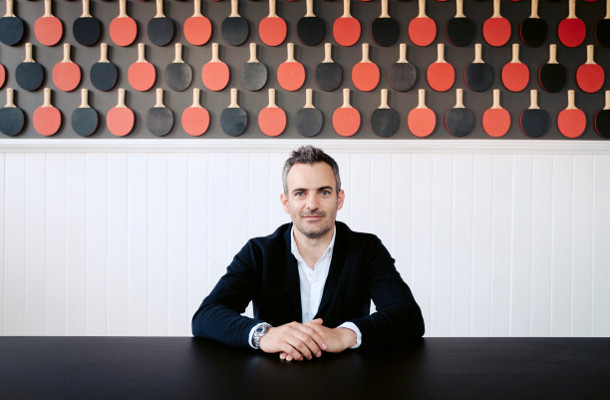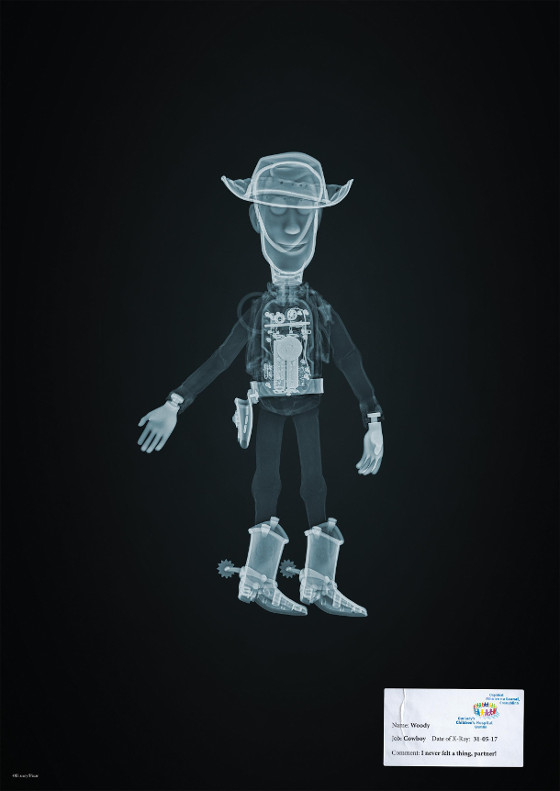
ICAD: Worshipping at the Altar of Creativity Since 1958

This Friday the bells of Christ Church Cathedral in Dublin will ring for a different reason to usual - celebrating the best creative work to come out of Ireland over the past year.
The ICAD Awards, run by the Institute of Creative Advertising and Design, will also be celebrating 60 years of the organisation - a non-profit, membership-led body that brings together its Irish members locally and connects them with a network of creatives across the globe.
Rory Hamilton, who works as executive creative director at Dublin creative agency Boys and Girls, is the ICAD President. LBB’s Alex Reeves asked him about the significance of this anniversary and what makes this year’s show particularly special.
LBB> So ICAD’s been around for 60 years? That’s a big deal!
RH> Yeah, it’s massive. We’re very proud of it. It’s one of the oldest award shows in the world. It’s kind of surprising that it comes from such a small market, I guess, in international standing. But there is a rich history of creativity here and I think the standard of work in general is going up year on year.
LBB> You’ve been on the ICAD board for four years and this is your second year as president. In those four years how has ICAD changed and what have been the big moments?
RH> ICAD’s changed quite a bit across the last four years. In fact this year, to mark our 60th we’ve labelled the year ‘The Bells of Change’. We want, as a body, to represent the changes that have happened in the industry and in the country over the years. There’s been some really interesting cultural change that we’ve been a part of. Advertising and design and ICAD was involved in the freedom of contraception campaign way back in the ‘80s and then was involved in the equal marriage referendum and obviously Friday is our referendum on the Eighth Amendment and abortion, which lots of the industry has been involved with too.
What’s changed with ICAD is we’ve tried to develop and further professionalise it to increase its relevance. So for the last four years that I’ve been involved it’s been internal, relatively boring stuff from the outside. We’ve changed our board structure to give us a longer-term executive board who sit to try and make sure ICAD moves in the right direction.
Also, rather than adding category upon category upon category like loads of international awards have done, four years ago we set out to reduce the number of categories to make sure we were just awarding the best work - not necessarily offering work an opportunity to win 14 times. Instead, just to be able to evaluate if it’s a really good idea, if it’s well executed and therefore if it should win, rather than finding a sneaky place it can fit in. And because we’re a not-for-profit and aren’t after the money we have an opportunity to do that. We’ve increased the standard of judging across the board and brought in an online round of judging to help improve the standards.
It’s a massive challenge because one of the things across the last four years (and the last 60) is the type of work that the industry here and internationally is doing varies massively. Whereas even four years ago there were many more TV ads and design of standard stuff like posters and leaflets, over the last four years it’s changed dramatically. Now we’re seeing entries that are about product or building design, user experience design, and really diverse entries like people producing TV shows rather than campaigns for brands. That’s refreshing to see.
LBB> In that sense I suppose Ireland is in line with a lot of the international market. What have been the biggest changes specifically for the country’s industry?
RH> Everybody here’s suddenly woken up to the international advertising community. There were years and years where people weren’t entering things like Cannes, D&AD, Epica or your Immortal Awards. We really weren’t looking abroad to see what else there was. In the last four years we’ve woken up to the fact that there’s a massive market out there - a massive creative opportunity - and also to see how we fare against international competition.
We’ve partnered up with D&AD for the last couple of years to enter anything that won a gold into the D&AD awards. What we found interesting is as we started to look at that international environment, the standard of work being entered into ICAD increased dramatically. We’re getting better work because we aren’t just competing against ourselves.
There’s actually quite a bit of global work that comes out of Ireland. From our perspective at Boys and Girls we do Jose Cuervo globally, we do Bushmills globally, we do Fitbit across EMEA and Digicel across the Caribbean and South America. We run a number of global accounts and I know we’re not alone in that. TBWA\Dublin’s producing Jameson and Rothco have a number of global accounts for work on Heineken and some interesting other work.
I think that’s partially because the work’s getting better. I’m not going to pretend that a load of companies being based in Dublin doesn’t help their access to the market, but we’re pitching against international agencies and winning, which is really refreshing to see.
The ‘90s were full of work leaving the country and the last recession saw a lot of work being centralised back to the UK or Amsterdam, which really hurt the industry, but over the last couple of years we’ve seen it come back and not just the Irish aspect of the work, but actually getting a shot at the global campaigns, which has been brilliant for all the agencies here.
LBB> That’s great to hear! And I’m guessing the awards will be a chance to reaffirm that. What are you most looking forward to about the show?
RH> The awards are being hosted by Panti Bliss, who is a campaigner for cultural change and has done great work. They’re also being hosted in Christ Church Cathedral, which is the biggest religious venue in Ireland and we’ll be ringing the church bells every time there’s a gold, to mark our 60th year, so it’ll echo across Dublin.
An important change we’ve brought in this year is our first lifetime achievement award, which is The President’s Award, and it’s been named after a famous copywriter called Catherine Donnelly, who died a number of years ago. We’re really keen on having a lifetime achievement award because the industry’s not very good, particularly here, at recognising years of experience and valuing seniority in advertising and design. We always want to award the latest idea and it’s such a youth-focused industry that it’s worth taking the opportunity to award those who haven’t just had a good year but who’ve had a good 40 years, in the case of this year’s winner.
LBB> Any pieces of work that you’d like to highlight as great examples of Irish creativity, ahead of the winners being announced?
RH> Absolutely. Since I’m not on the jury I genuinely haven’t seen the winner. So I have no idea what’s come out and done really well. Looking at the work that was entered and certainly the work that’s been commended, there are some really interesting opportunities that people have seen.
One of my favourite campaigns that we didn’t do is by BBDO Dublin - a simple idea about trying to stop children feeling scared of getting an x-ray done in a children’s hospital. They took all the characters from Toy Story, x-rayed them and decorated the entire room with it. From my perspective it feels like a really interesting idea but it’s also a great use of media. It isn’t just a poster; its something else.

We’ve had interesting campaigns even for what are usually less interesting segments. A campaign done last year for Lidl by Chemistry called ‘TrolleyCam’. They simply filmed a load of couples going around the supermarket. It produced genuine insight into the way people shop and how they think. They managed, in documentary style, to produce stuff that was genuinely funny and heartwarming and real. I think it was a big change in the type of work that was being produced in that segment. It was really brave. And I think most people in the industry wish their clients would sign up to that kind of thing.
LBB> ICAD started in 1958. Can we look back to what advertising in Ireland was like then?
RH> TV advertising had only just started. The national broadcaster in Ireland is pretty old. RTÉ was one of the first, so we’ve had TV advertising for a long time. But back then if you look at the things we were advertising, it was cigarettes and things that you certainly aren’t allowed to advertise anymore. We’ve produced quite a lot of booze advertising as you look back, but actually there was a lot of advertising for farming products that you wouldn’t get now. Even when I was a kid in the ‘80s it was ads for IVOMEC Pour-On and fluke medicine [drugs for cattle], which are entire segments that just don’t exist anymore.
What’s interesting is that even though the types of advertising and where we advertise have changed dramatically, and even though the people we get to advertise for have changed dramatically, even then we were rewarding the same things we do now - a brilliant idea, really well executed. There’s a consistency across all that difference over the last 60 years.
The first awards took place in a local boozer in Dublin called Smyths, which is still a favourite advertising haunt. It’s interesting to move from Smyths to Christ Church Cathedral, and yet still be awarding the same kind of stuff. From a place where you worship pints to where you worship God, but in service of worshipping the best ideas.













